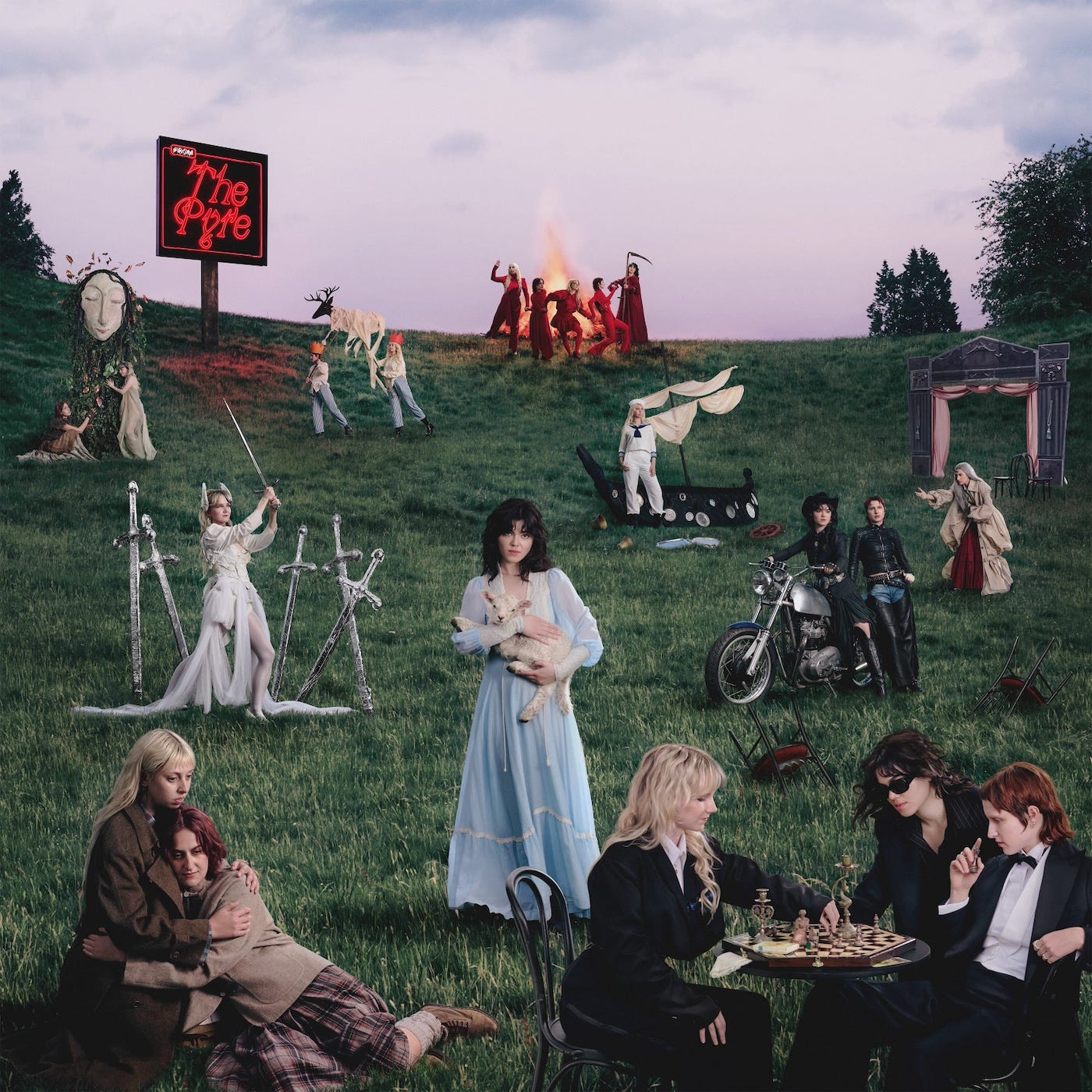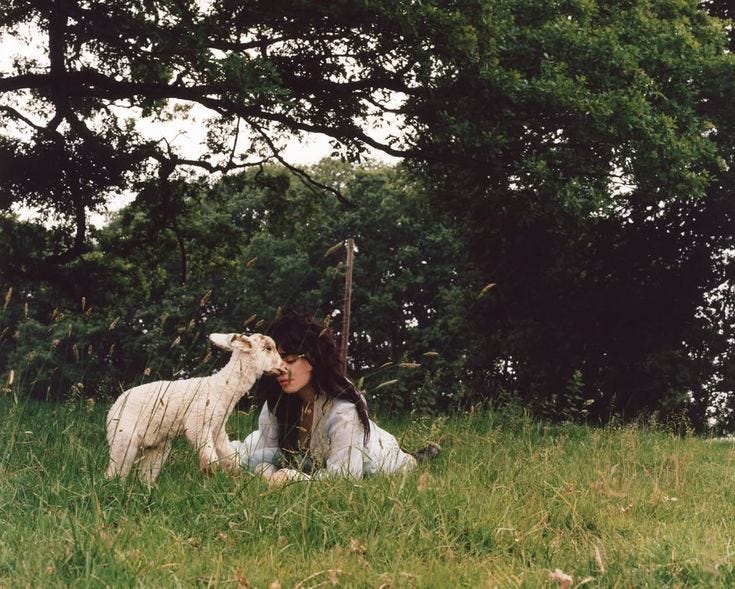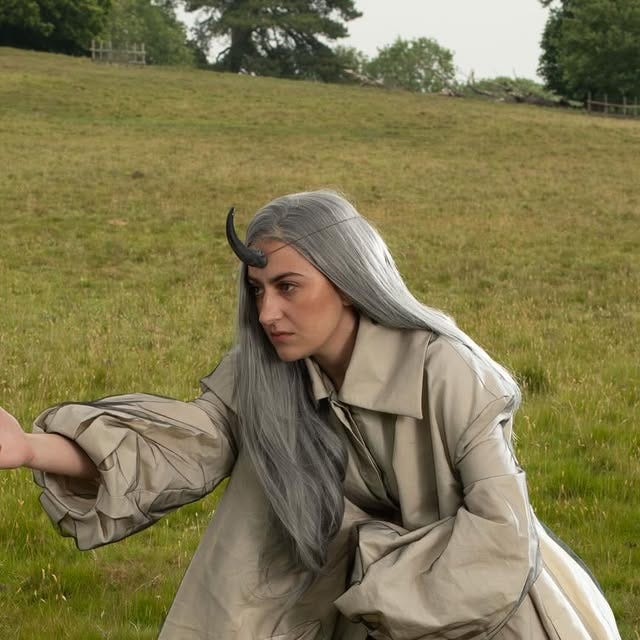Twenty months ago, in February 2024, The Last Dinner Party made waves within the indie rock genre with the release of their debut studio album, “Prelude to Ecstasy.” The girl group—consisting of Abigail Morris (vocals), Lizzie Mayland (vocals, guitar), Emily Roberts (lead guitar, mandolin, flute), Georgia Davies (bass), and Aurora Nishevci (keyboards, vocals)—has distinguished itself from its peers with a unique blend of theatrical performance, intense lyricism, classical instrumentation, and poignant display of the highs and lows of human emotion.
“From the Pyre” expands on the concepts of “Prelude to Ecstasy” through a more straightforward musical narrative. Similarly, the songs of this album focus on the intensity of human emotion: lust, passion, fury, despair, elation, etc. However, The Last Dinner Party explicitly stated that, for this album, they intended for each song to tell a different story from the perspective of various characters visiting the namesake of the album, The Pyre.
“‘The Pyre’ itself is an allegorical place in which these tales originate, a place of violence and destruction but also regeneration, passion, and light,” they said.
Agnus Dei
Agnus Dei: an emblem of Christ as a young sheep holding a flag; a sacrificial lamb leading followers to salvation.
“Agnus Dei” begins with a vision of the speaker’s lover as a burning head, arms open, singing Lee Hazlewood, a 50s-era country-pop singer, infamous for his rumored affair with collaborator Nancy Sinatra. This vision immediately presents the thesis for this song: the idea that fame, love, and violence are a Holy Trinity of self-destruction.
Throughout this song, these three ideas are so aggressively intertwined that the listener cannot tell where yearning ends and hostility begins. Imagery of fame is woven in with the violently amorous sexual innuendo, possibly implying that sex is a performance, or to perform is sexual (this could also tie into the idea of the crucifixion as a performance, the sacrifice of the lamb).
“You’re my burial ground/ I’m in love with the sound/ You make into the microphone/ I just wanna make you stay.”
This song could relate to the image of The Pyre on the album cover, depicted in bright red neon lights, much like the entrance to a music venue. By becoming famous, the subject has succumbed to the fleeting eroticism of fame, becoming the sacrificial lamb.
Check out the Instagram post here
Count the Ways
Similar to “Agnus Dei,” “Count the Ways” paints a bloody picture of passion and temptation. Unlike the prior song, this one’s instrumentation is much more of an upbeat jaunt, juxtaposed with the grim lyrics. The speaker engaged in a romantic relationship so intense that she, literally or metaphorically, passed away.
The lover takes her home and makes it his own, finding someone more suited to be a wife: “Now my house is your house/And it is a nice house.” This song plays into a problem many women encounter in the contemporary dating world.
“I can hear strings/That should be for me/I can see rings/That should be for me.”
Many men will have sex with a free-spirited woman, one who is confident in her sexuality, but he would never make this woman his wife. She is made to be the sole sufferer of the loss, “I will twist my knife right/I will twist my knife left.”
Second Best
“Second Best” is the first song on this album to, somewhat explicitly, describe lust through a sapphic relationship. In the lyric video, lead guitarist Emily Roberts is dressed as an angelic knight, suggesting she is loyal to her toxic relationship, possibly to a destructive degree. She stands in an open field beneath a stage facade, wearing a stark-white, flowing dress and holding a sword, with angel wings clipped in her hair.
The chorus repeats over and over how “nice” it is to be “second best,” illustrating the repetitive nature of this abusive dynamic. This is because her character is in a relationship with someone who doesn’t care for her. The use of the word “babe” may imply that the subject is a woman, using Roberts’s character sexually and romantically, and simultaneously hiding her.
“Babe, you know it ain’t fair/You leave me again/He’s waiting downstairs/There’s always somebody downstairs.”
This betrayal is emphasized by the growing crescendo and consistent lyric repetition toward the culmination of the piece: “What do I do to be better for you?” Also, this song’s instrumentation is buoyant, in contrast to the lamentable situation. Roberts elaborated on the inspiration for this song on the UK-based music publication, Dork Magazine.
”I wish I could go back and say to myself that I am worth more than that, and that no one needs to accept being second best,” she said. “I hope that the song captures the pain, anger, and despair I felt, but most importantly, the defiance and satisfaction I now have.”
This is the Killer Speaking
This western-style jaunt uses cowboys, running from the police, and straight-up murder to describe the feeling of being ghosted by a lover. Specific nods to contemporary ghosting include the use of the phrase “on the line” in the chorus, implying the speaker is repeatedly calling her ex-lover.
Much like the other songs, “This is the Killer Speaking” combines imagery of violence with allusions to sexual intimacy, making them appear one and the same. The speaker resents the subject and delves into this hatred by leaving society, becoming an outlaw, and joyfully taunting this person.
“I hope your back is healing from that brutal flaying/And your coat’s still stained with me/Wear it with my pride pinned to the lapel/God knows I left him by mistake.”
This song was the first single off “From the Pyre” to be released on Spotify, likely due to its fun and relatable nature: if one has dived into the dumpster that is modern dating, they have probably been ghosted. This early song release was paired with the premiere of the mythically whimsical music video, which features each band member performing in a shady, Western-style nightclub called The Pyre (the setting for each story in this album).
Rifle
“Rifle” is the midpoint of this album, and it completely shifts the tone. The song is somber, with gentle string-centric instrumentation, highlighting Abigail Morris’s dynamic vocals. From the mother’s perspective, she sings the all-too-common story of a mother watching her son grow up in a world filled with violence and destruction.
This song is written with a pointed focus on biblical allegory, as the mother calls back to the metaphors introduced in “Agnus Dei,” describing her son as a Christ-like figure, a sacrificial lamb.
“In that cave we found/Cloth and steel that bound/Your callous hands/Rising from the tomb/Of your mother’s womb.”
This mother is forced to sit by and watch as her son is corrupted by patriarchal expectations of masculinity. She has to watch as her son grows to hate the tenderness of his family, as he grows “loud” and “ruins” his mother. This message culminates in the angelic French chorus, which reveals the mother accepting that her son’s spiral cannot end because he is the end.
“I escape into the clouds/But the sky has nothing to say to me/The stars turn their faces away/The dawn crawls through the night/This is you, my son, you are the end.”
Woman is a Tree
“Woman is a Tree” follows the philosophical shift started by the previous track. This song is much murkier than the first half of the album, creating a dim comparison between women and trees.
Women are like trees, standing still as the world around them falls apart, providing society with life, sheltering those weaker than her, and used for capitalistic gain. This metaphor is common in many pieces of art and poetry surrounding the destruction of nature: nature is woman, industrialization is man. Trees are beautiful providers, yet men mutilate them to create commodities.
“Woman is a tree/Livid hero, I am here/With deluxe understanding, I’ll shelter your soul/Sister of mine, you will never grow cold.”
The metaphor of woman as tree is, at first glance, beautiful, especially given the gorgeous puppet that represents her on the cover. However, comparing women to an unmoving thing that must succumb to the whims of the world surrounding her is disturbing. She can only be at peace when providing for those around her; she has no self.
I Hold Your Anger
Morris steps aside for this song, as Aurora Nishevci, the band’s keyboardist, sings the lead vocals. “I Hold Your Anger” is a poetic exploration of female generational trauma that asks questions about why many women feel the need to nurture to the extent of self-destruction.
The speaker positions herself as the epicenter of the challenges faced by those around her, blaming herself for their faults: “I dreamt that you cut off your arm/And I blame myself, I should have told you to be careful.” Nishevci pours her heart out through a jazzy vocal twang over classic-rock-esque guitar, asking The Last Dinner Party’s predominantly female audience to consider, why?
“I’ve nеver known/Where othеrs begin and I end/But it’s always you before me/Until the gods come crashing down.”
Is a woman’s life predetermined to follow the steps of her mother, her ancestors? When does the cycle end? She is like a “ship inside a bottle,” something with a fragile, easy-to-break exterior contrasted by the strong structure inside made to hold tons of emotional cargo “‘til the levee breaks.”
Sail Away
Morris’s vocals are fantastic at increasing a song’s emotional depth. Reading these lyrics on a page may make one’s heart ache, but Morris’s shaky vibrato can bring them to tears.
“Sail Away” uses themes of coldness, possession, and the ocean to convey a relationship’s slow, bleak decline. The speaker yearns to return to childhood innocence and simplicity, but a rift has formed that is so wide, she might as well be on a ship, taking the subject with her to sail away.
“If I could find a way/To wipe out every day/I didn’t spend a second in your bed/Then I would take my ship/Have no one else on it/And sail away.”
The sea as a metaphor for love is fitting when describing the slow breaking of a relationship. Its vastness represents love’s limitlessness, and its changing tides and currents symbolize love’s always-changing dynamics.
The nostalgic language also ties this metaphor to memory, something that cannot be erased, despite the speaker wanting to erase every day she didn’t spend with this person. The memory of the subject both haunts and comforts, as she wishes she could return to driving “to the beach” and “skipping stones across the quay.”
The Scythe
This slow-burning ballad was first written by Morris nine years ago, like a prophecy. She articulates the pain of a breakup by comparing it to an execution.
She wishes she could’ve inflicted the pain, “It’ll take you too, mm/Take a long time/Limbs’ll disconnect, mm/Like the phone lines,” but the other party was the first to express their desire to part, so she resorts to begging, “Make it quick so I can’t see the scythe in its sheath.” This paired with the recurring imagery of phone calls and phone lines symbolizes a breakup occurring over the phone, with both individuals too emotionally hurt to contact each other again.
“Don’t cry, we’re bound together/Each life runs its course/I’ll see you in the next one/Next time, I know you’ll call.”
Much like the other grim songs on this album, “The Scythe” refuses to match its tone to the solemn lyrics. This juxtaposition also highlights how music is connected to memories: these two people are bound together through the more lightheated media they consumed together, now, the pain and delight cannot be separated.
“I wrote it before I had known anything of grief or heartbreak, how a relationship ending feels exactly the same as that person dying. Once you know how it feels to lose someone you enter a new realm from which you can never return. You’re trying to reach them telepathically through psychics or song lyrics (sometimes those two become the same) and sometimes they give you a reply. It can take 9 years to realise you’re even grieving at all, but once you do, you see them everywhere – in a robin, in a street fox, in a Wim Wenders film. The Scythe comes for everyone, and you shouldn’t be afraid about what’s on the other side,” Morris said in an interview with Dork Magazine.
Inferno
Much like “Mirror” in “Prelude to Ecstasy,” “From the Pyre” concludes with an emotionally poignant display of a performer’s identity crisis. Performers who sing about how difficult it is to perform will always have a unique impact on the audience that has only learned about them through their carefully curated performances.
The inferno in this song could be referring to two things: an out-of-control fire or Hell (specifically as described in Dante Alighieri’s “Divine Comedy”). The speaker refers to “breathing” and “drinking” the dust of the inferno, which illustrates her surrendering to the chaos of fame: the normalized self-medication, the constant climb for perfection, and the lack of personal privacy.
This desire to match the perfect expectations of the audience is illustrated in the song’s desperate plea to “keep trying,” along with the introductory verse focusing on iconic imagery of perfection.
“I’m Jesus Christ, I’m swinging/In a gallery in France/I’m the guillotine, I’m terrified/There’ll be no second chance.”
The performer is forced to reveal the sins beneath her idealized feminine exterior, and it is driving her mad. However, the song ends with a hushed acceptance that the performer will never truly know where her glamorized persona ends and true self begins; she has plunged so deeply into the chaos that she has become her own inferno.
“I’ve never seen myself/And I hope I never know/I’m nothing but a shell/Nothing but dust, in an inferno.”
Although the stories themselves are fictional, the feelings are not, and each song intends to push the concepts to their “pathological extreme.” From seeing a situationship as an incarnation of the Holy Spirit, to feeling a breakup is the same as an execution, “From the Pyre” is a perfect theatrical encapsulation of what it is to be an emotionally vulnerable woman in a strikingly confusing world.
“Being ghosted becomes a Western dance with a killer, and heartbreak laughs into the face of the apocalypse. Lyrics invoke rifles, scythes, sailors, saints, cowboys, floods, Mother Earth, Joan of Arc, and blazing infernos,” they said. “We found this kind of evocative imagery to be the most honest and truthful way to discuss the way our experiences felt, giving each the emotional weight it deserves.”







